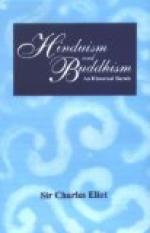The power of inventive imitation is characteristic of Taoism.[566] In most countries great gods are children of the popular mind. After long gestation and infancy they emerge as deities bound to humanity by a thousand ties of blood and place. But the Taoists, whenever they thought a new deity needful or ornamental, simply invented him, often with the sanction of an Imperial Edict. Thus Yu-Ti,[567] the precious or jade Emperor, who is esteemed the supreme ruler of the world, was created or at least brought into notice about 1012 A.D. by the Emperor Chen Tsung[568] who pretended to have correspondence with him. He is probably an adaptation of Indra and is also identified with a prince of ancient China, but cannot be called a popular hero like Rama or Krishna, and has not the same hold on the affections of the people.
But Taoism is also the name commonly given not only to this fanciful church but also to the philosophic ideas expounded in the Tao-te-ching and in the works of Chuang-tzu. The Taoist priesthood claim this philosophy, but the two have no necessary connection. Taoism as philosophy represents a current of thought opposed to Confucianism, compared with which it is ascetic, mystic and pantheistic, though except in comparison it does not deserve such epithets. My use of pantheistic in particular may raise objection, but it seems to me that Tao, however hard to define, is analogous to Brahman, the impersonal Spirit of Hindu philosophy. The universe is the expression of Tao and in conforming to Tao man finds happiness. For Confucianism, as for Europe, man is the pivot and centre of things, but less so for Taoism and Buddhism. Philosophic Taoism, being somewhat abstruse and unpractical, might seem to have little chance of becoming a popular superstition. But from early times it was opposed to Confucianism, and as Confucianism became more and more the hall-mark of the official and learned classes, Taoism tended to become popular, at the expense of degrading itself. From early times too it dallied with such fascinating notions as the acquisition of miraculous powers and longevity. But, as an appeal to the emotional and spiritual sides of humanity, it was, if superior to Confucianism, inferior to Buddhism.
Buddhism, unlike Confucianism and Taoism, entered China as a foreign religion, but, in using this phrase, we must ask how far any system of belief prevalent there is accepted as what we call a religion. Even in Ceylon and Burma people follow the observances of two religions or at least of a religion and a superstition, but they would undoubtedly call themselves Buddhists. In China the laity use no such designations and have no sense of exclusive membership. For them a religion is comparable to a club, which they use for special purposes. You may frequent both Buddhist and Taoist temples just as you may belong to both the Geographical and Zoological Societies. Perhaps the position of spiritualism in England offers the




